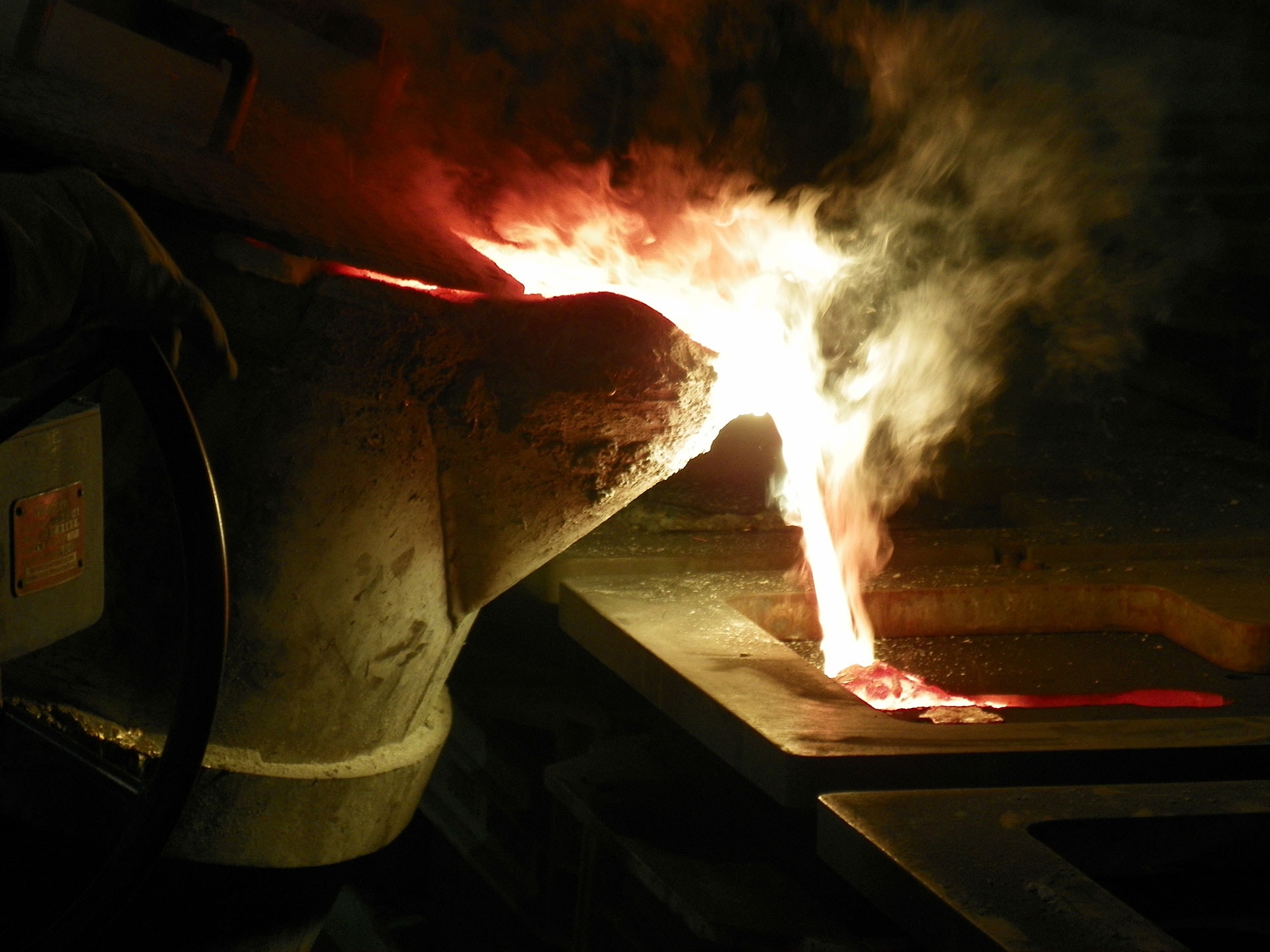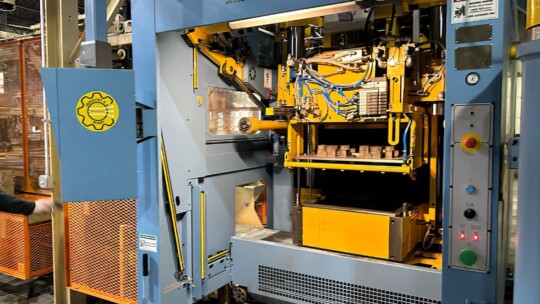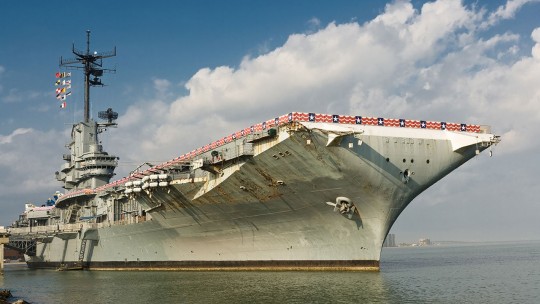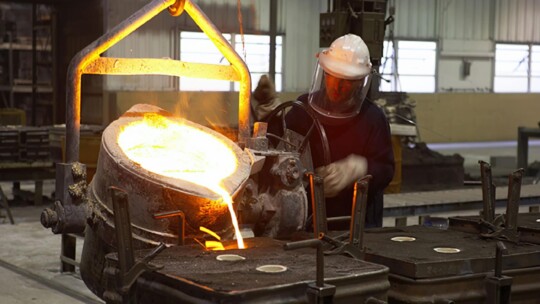Manufacturer of Aluminum Bronze Castings
Manufacturer of Aluminum Bronze Alloy Castings
Erie Bronze and Aluminum is a trusted manufacturer of aluminum bronze castings that alloys a wide range of alloys in-house using our state-of-the-art facilities. Our non-leaded bronze castings are made to serve industries ranging from plumbing goods manufacturers to defense contractors. Take a closer look at our aluminum bronze casting capabilities that additionally include casting services for manganese bronze, tin bronze, and silicon bronze. Our manufacturing can abide by a range of specifications including ASME and ASTM specs. We have additional experience in compliance with Mil-Specs and use a SPECTROLAB metal analyzer to ensure these spec requirements are met. Contact our team today for a competitive quote.

Aluminum Bronze Castings (952, 953, 954, 955, 958)
Pouring aluminum bronze alloys is among our most popular services, as we can pour 952, 953, 954 aluminum bronze and more. These high quality aluminum bronze alloys are wear resistant, exhibit good welding characteristics, and have exceptional mechanical properties. With their ability to withstand corrosion in a range of environments like seawater, chlorides, and dilute acids, aluminum bronze castings are suitable for a multitude of applications. Since they are non-sparking, they are suitable for equipment designed to handle explosives, petroleum, chemical, and gas products. If the aluminum bronze alloy contains more than 10% aluminum, it can be heat treated to boost mechanical properties for environments expected to generate greater wear and impact on the alloy. EBA excels in aluminum bronze castings, so don’t hesitate to request a quote for your next project.

Manganese Bronze Castings (862, 863, 865)
When customers contract Erie Bronze for our strongest cast copper alloys, they choose Manganese Bronze. We can pour 862, 863, and 865 manganese bronze at our foundry, which are primarily used for heavy duty mechanical products requiring moderately good corrosion resistance. In addition to their wear resistance, our manganese bronze castings can be poured at a reasonable cost, making it easier to find solutions for heavy duty environments. These alloys not only have high tensile and yield strength but can operate under high loads and speeds. If you want to learn more about the benefits of Manganese Bronze, contact EBA for a discussion.
Tin Bronze Castings (903, 905, 907, 911)
Tin bronze alloys provide reasonable corrosion resistance, moderately high strength, good wear resistance, and a lower coefficient of friction compared to steel. These castings are capable of accepting shock and impact loads, but with reduced surface speeds which makes them an excellent choice for high strength bushing and bearing applications alongside moveable bridge components. We can pour 903, 905, 907 Tin Bronze, and more at EBA. Our Tin Bronze Castings can be alloyed in accordance with the SAE 620 spec, also known as Navy G Bronze. If your equipment requires a low friction coefficient while also providing corrosion resistance and durability, our Tin Bronze Castings may be the ideal solution and you can contact us for a quote today.
Silicon Bronze Castings (873, 875)
Silicon Bronze is designed to provide a moderate strength casting, which will exhibit good corrosion resistance when submerged in liquids or chemicals. Applications of silicon bronze range from bearings and gears to plumbing goods and intricately shaped pump and valve component manufacturing. Our casting facility alloys 873 and 875 silicon bronze in-house, and we have the equipment needed to test our alloys to ensure they meet the spec(s) your job calls for. If you have a valve component or a pump with a complex shape that is going to be in a corrosion exposed environment, Silicon Bronze may serve as the ideal casting to contract our team to provide.


Proven Quality
All metals are alloyed and tested in-house using an optical emission spectrometry (OES) Spectrometer. Optional test bars and chemistry reports are available to meet the customer’s QS and ISO requirements for aluminum bronze casting and all other casting alloys we offer.
Bronze Casting Material
- ASTM B148 – This Specification Establishes Requirements for Sand Castings Produced from Copper-Base Alloys
- AMS 2175 – This Specification Establishes Nondestructive Testing Methods, Sampling Frequency, and Acceptance Criteria for the Inspection of Metal Castings
- AMS 4860 – Manganese Bronze, Sand and Centrifugal Castings
- ASTM B427 – This Specification Establishes Requirements for Gear Bronze Alloy Castings
- ASTM B584 – Standard Specification for Copper Alloy Sand Castings for General Applications
- ASTM B763 – Standard Specification for Copper Alloy Sand Castings for Valve Applications
- MIL-B- 24480 – Military Specification Bronze, Nickel-Aluminum Castings for Seawater Service
- QQ-C- 390 – Military Specification Copper Alloy Castings
- MIL-B- 21230A – Military Specification, Bronze, Nickel Aluminum, and Manganese-Nickel Aluminum Castings, Ship Propeller Application
- MIL-B- 16540B – Military Specification, Bronze, Phosphor Castings
- MIL-STD- 2175A – Military Specification, Castings, Classification, and Inspection
- SAE 620 – Navy G Bronze, Tin Bronze
- SAE AMS 4871F – This Specification Covers an Aluminum Bronze Alloy in the Form of Centrifugal and Chill Castings
- ASTM B22 – Standard Specification for Bronze Castings for Bridges and Turntables
- ASTM B824 – Standard Specification for General Requirements for Copper Alloy Casting
Request a Quote
"*" indicates required fields



